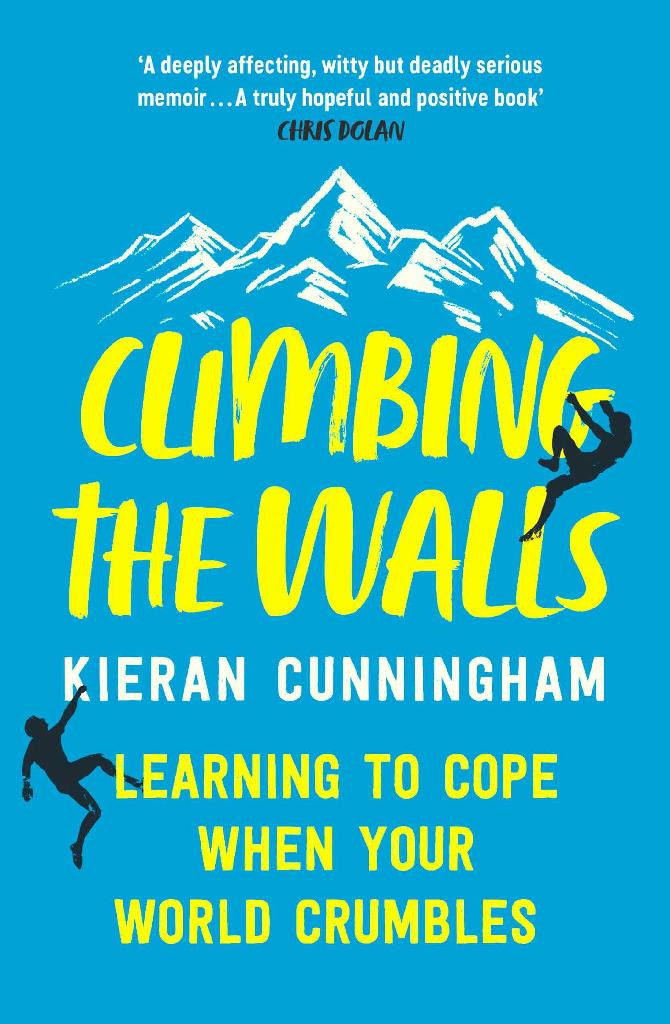Climbing The Walls
Posted by Jeremy Windsor on Feb 24, 2023
For many of us, a visit to the mountains has a positive effect on our mental health. But what if these opportunities are suddenly taken away? Here's Tony Page to tell us about Kieran Cunningham's "Climbing the Walls", a memoir that describes the effect lockdown had upon his life in the Italian Alps...
I suspect at least a few of us started a covid-19 diary early in 2020 but I wonder how many of us kept it up? Scottish mountaineer and journalist Kieran Cunningham had an advantage here, as he’d been keeping a daily record since he was a teenager. His book, Climbing the Walls, is his memoir of the first two months of the pandemic.
He was living in Sondrio, a small town in Lombardy in the Italian Alps and he’d just returned from seeing his girlfriend in Istanbul when Lombardy emerged as the European epicentre of covid-19. He’d moved to Sondrio six years previously, working at first as an English teacher but latterly found that he could manage financially working as a freelance online journalist and that being able to choose his working hours gave him the flexibility to spend more time in the mountains.
The complicating factor, and what for me made the book so interesting, is that Cunningham has bipolar disorder. Over the years he had developed strategies for managing his mental health: writing his journal, meditation, rock climbing, mountaineering, ski touring and support from his tight-knit group of mountaineering friends. He was also very close to his family, with regular text and phone contact with his parents in Scotland and sister in New York, supplemented by reciprocal visits. Abruptly, these routines were interrupted by the imposition of one of the most restrictive infection control regimes outside of China. Of course he could still meditate, write his journal, phone his family, WhatsApp his friends and video call his girlfriend, but the mountains were out of bounds and the only permitted excursions were for essential shopping and visits to the doctor. Outdoor exercise was only allowed for ‘compelling’ health reasons that did not include routine walking or jogging for general fitness.

In 2022, Kieran's book was shortlisted for the Boardman Tasker Prize. Chair of the judges, Marni Jackson wrote, "Climbing the Walls is a reminder of the healing power of mountains and why they matter..."
Though structured like a diary, from Lockdown -3 Days to Lockdown Day 62, plus an epilogue, Cunningham digresses from the quotidian by working incidents from his past, and people he’d met, into his narrative. He realises that he will run out of medication (sent in the post by his mother from Scotland) and reduces the dose to eke it out. Support from his 90-year-old landlady and from some of her family members proves crucial, especially when he recognises that his mood is becoming unstable. But equally as important to maintaining his equilibrium are the walls that give the book its title. Metaphorically he is ‘climbing the walls’ out of frustration, and later, perhaps, ‘climbing the walls’ might allude to his disordered mood. However, less than two weeks into lockdown, walking round his landlady’s garden, he realises that the eight-foot-high stone wall that surrounds it is climbable. He dashes inside for his rock shoes and begins traversing - literally climbing the walls!
Climbing the walls becomes an essential activity, part of his routine. He draws up a list of reasons to stay positive and identifies the activity as his greatest source of consolation and means of coping. He names, grades, and writes descriptions of the routes. He is stung by a scorpion going for a fist jam between two granite blocks. His hand doubles in size and that route becomes The Scorpion Wall. Towards the end of the lockdown he realises that he is becoming manic, but just in time restrictions are eased and he can go for a jog. Two days later he climbs some routes at a local crag, using a self-belay device because climbing with a partner is not allowed and three days after that he climbs two of the local mountains. Cunningham is no stranger to suicidal thoughts and they return, unheralded, on the summit of Pizzo di Rodes, at 2850m the first of these peaks. There is an 800-foot drop below. On previous occasions he has been huddled up crying, hugging his knees to his chest: in the shed with his grandfather’s gun; or on a clifftop or on the edge of a crevasse; or during the course of an overdose. However, this time he remains calm, lets the thoughts come, and go, and heads instead for Pizzo Redorta, his favourite mountain in the region.

The paperback version of "Climbing The Walls" is available now from all good book shops!
He realises that these activities didn’t represent a ‘new normality’ as they were solitary and in the epilogue he reflects on being reunited with his climbing friends at the crag. He concludes that his happiness, and that of his friends, at this meeting wasn’t in celebration of the end of quarantine, or of the end of the pandemic (which wasn’t over anyway), or even of the return of freedom, but was in celebration of being alive.
I highly recommend this book. For the general reader, the experience of lockdown is something we can all relate to, and Cunningham describes his thoughts and feelings as events unfolded with acuity and candour. The differences between the Lombardian version of lockdown and the UK version(s) are interesting in themselves. For mountaineers, we can compare how we coped with our reduced access to the hills and crags with how a fellow mountaineer in northern Italy used the resources (literally) on his doorstep to act as a substitute for activities that were forbidden. The medical reader with an inclination towards the medical humanities might see the book as an unusual example of an ’illness narrative’, and a mountain medic might recognise it as a case study underlining the importance of outdoor activity in relation to mental health - the extra dimension being, of course, how Cunningham managed his bipolar disorder and how he adapted his self-care strategies to deal with the exigencies of lockdown. Whatever your take on it, the book is very well-written and I’d be surprised if it didn’t hold your attention through to the end.
Thanks Tony!
Read Tony's review of "The Vanishing Ice" here.
Thanks for reading this post. If this is your thing why don't you take a look at other posts on the blog? Better still, why not join the British Mountain Medicine Society? More information can be found here
For more information about the University of Central Lancashire's Diploma in Mountain Medicine (DiMM) take a look at this.
Comments
Leave a comment.
Leave a comment.



 )
)